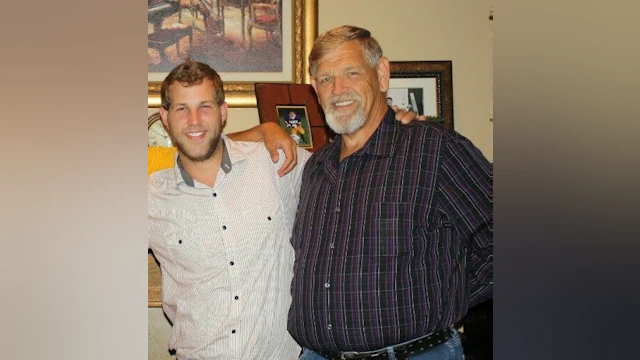Jan. 25, 2019 - Bubba Randall joined the board of our Louisiana chapter after losing his dear son Jessie to suicide in 2015. Among his many roles, he has been the driving force in bringing our Healing Conversations program, which connects trained loss survivors with the recently bereaved, to his state.
On April 7, 2015 we lost our 24-year-old son, Jessie Lee Randall, to suicide. He had struggled with depression, though we hadn’t recognized to what extent at the time. As we tried to cope with our loss, I met someone who told me about the American Foundation for Suicide Prevention. She also told me she needed volunteers to help plan the Out of The DarknessTM Walk taking place that October. I realized this was an opportunity to learn more about suicide by being with other survivors, and at the same time, help the community.
Jessie had a tattoo on his leg that read, “For You, I Will.” I once asked him what it meant. He answered simply, “If you need something done, I will do it.”
This fit Jessie’s personality perfectly. He often went out of his way to help people. It didn’t matter if he knew you for years, or if he had just met you five minutes ago. If you needed help, you could count on him to lend a hand.
After he passed, I thought a lot about his tattoo, and how he lived his life. I decided I wanted to help people, too.
I’m now on the board of AFSP’s Louisiana chapter; I chair the Baton Rouge Out of The Darkness Walk; I have traveled to Washington, D.C. to take part in AFSP’s annual Advocacy Forum; and I am the Louisiana coordinator for the Healing Conversations program.
AFSP’s Healing Conversations program is particularly dear to my heart. I remember when we lost Jessie, a detective with the sheriff’s office told us she was sorry for our loss. She was compassionate, but that was it. That was all she could offer. We didn’t know where to go from there. How could we start to heal?
The Healing Conversations program connects trained, longer-term survivors of suicide loss (at least two years or more) with those who are newly bereaved. Our SOP volunteers know firsthand what it’s like to lose a loved one to suicide, and are able to assist those who have just lost someone in finding their own path to healing.
Once I got involved with SOP, I realized sheriff’s departments could be helpful in getting the word out to loss survivors. I approached my local sheriff and offered to give a 30-minute presentation to his office about the program and the benefit it could have to the community. The sheriff liked the idea, and after the presentation, I gave everyone an SOP wallet card, which contains a brief description of the program, with links to further resources and information. I challenged the people there that day to put the card in their uniform pocket and carry it around – just like a badge – every day. They could then give the card to any families who had just lost someone to suicide.
One of the hardest – and most gratifying – SOP visits I’ve ever been on came as a direct result of that presentation. Two weeks later, I received a call from a survivor saying she had gotten my card from a deputy. When I input her address into my map app, it led me to the house directly across the street from my son’s old house, where he had taken his life.
All my memories of the night I lost my son came flooding back the moment I got out of my truck and looked over and saw Jessie’s former house. I wasn’t sure I could go through with the visit.
I then looked down at my wrist. After Jessie’s passing, I had gotten a similar tattoo to Jessie’s, that read, “For You, I Will.” The tattoo also includes a semicolon, rather than a comma. This is a symbol that for many people affected by suicide, indicates the sentence is not yet over. It is a sign to keep going.
I wiped the tears from my eyes, looked down at my wrist, and said out loud, “For you I will, son. I will go in and be your voice.”
One of the reasons I know the Healing Conversations program saves lives is that I see the young mother I visited that day from time to time in the grocery store. She tells me that if it hadn’t been for my coming and talking to her, she doesn’t think she would still be here.
My hope for the future is to visit every sheriff’s department throughout Louisiana, meeting and connecting with the local police, and sharing our resources so they may share with the newly bereaved.
Through AFSP, I have gained a family: a group of people who support each other in our lowest times, and share special memories with. I am committed to helping my community and other communities in Louisiana. It is so important to me that everyone knows we are there to support them.
For them, I will.
This piece originally appeared as a Volunteer Spotlight Story in AFSP’s 2018 Annual Report. For other inspiring and emotional Volunteer Spotlight Stories, and to learn more about our exciting work, visit afsp.org/2018report.
